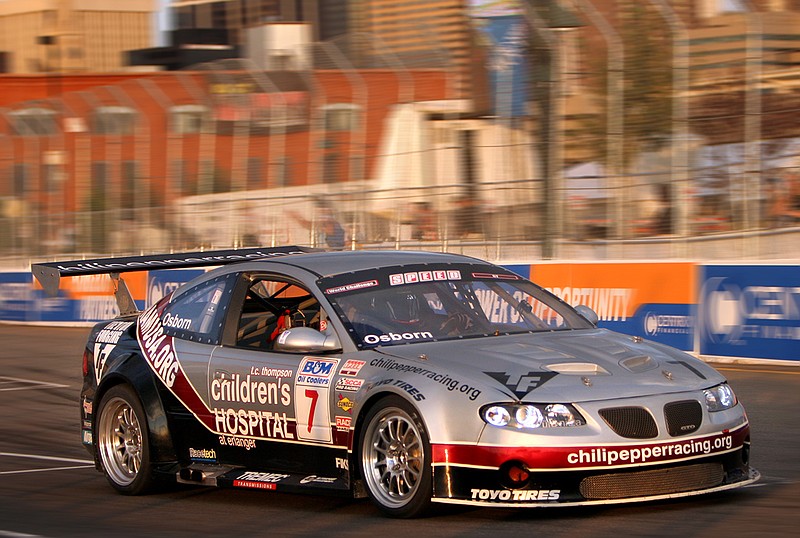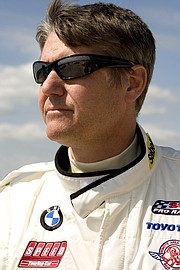Photo Gallery
Doctor, racer, rancher: Local orthopedic surgeon wears many hats, but being Dad changed his life
Jim Osborn is a Chattanooga surgeon, cowboy and race car driver.
"I guess the only cool job I haven't had held is astronaut and fireman," Osborn says, laughing.
He's never been a movie star but he is as tall and handsome as one; his racing pit crew nicknamed him "George Clooney." And the way he met his beautiful blonde wife, Amy Jo, sounds like it could have been a "meet cute" in a Hollywood romcom.
She was a photographer for Southern Living magazine, assigned to take photos of him racing a Ducati red BMW in the 2003 Petit Le Mans Race at Road Atlanta. At the time, he was an orthopedic surgeon who raced cars professionally for the Chili Pepper Racing team then donated his winnings to T.C. Thompson Children's Hospital.
"He kept asking me out to dinner and I would wave him off because I thought he was just being polite," Amy Jo remembers. "Then I finally realized he was asking for a date. We dated two years then got married."
While an operating room and a raceway may seem to attract opposite personalities, Osborn is comfortable in both worlds.
"Racing is a huge adrenaline rush that takes huge attention to detail, training and hard work if one is to be successful," he says.
He hasn't driven a race car professionally since 2009, but he still owns the Chili Pepper Racing team so he remains involved in the sport. But the racing prize he's proudest of was won for reasons that had nothing to do with speed.
In 2003, he was given the Jim Cook Award, the highest non-racing award from by the racing series World Challenge. Osborn was given the award for his consistent display of good character, sportsmanship, charitable contributions and work on behalf of the underprivileged and disadvantaged.
All this might cause one to wonder if Osborn, 53, is too soft-spoken and empathetic for a sport known for aggressive alpha males. One would be wrong because Osborn can be a fighter when he has to be. A few minutes after discussing his Jim Cook award, he recalls how he handled an obnoxious driver who kept cutting him off dangerously close in one race.
He T-boned the other racer's car.
The driver was not hurt but he learned his lesson.
"I still have my dashcam video of that," Osborn says cheerfully.
Raising Wagyu
The couple lives on Chili Pepper Ranch in Apison, 40 acres of rolling green hills scattered with golden buttercups, wild bluehearts and frost-white baby's breath. This is where the Osborns raise two fairytale pretty daughters - Zoe, 8, and Anabelle, 6 - and cute 5-year-old son James.
Also sharing the ranch with them are four frisky hens, a rooster, three big dogs and a herd of Wagyu cattle. Translated as "Japanese cow," Wagyu beef is legendary for its delicious juiciness. Kobe beef is a type of Wagyu, whose cattle are genetically predisposed to produce well-marbled beef that contains more healthy omega-3 and omega-6 fatty acids than American beef.
On the ranch, the Osborns experiment with the ratio and types of grasses, flowers and food they feed different cows within the herd. When those cows become steaks, the Osborns invite restaurant chefs in the area to a tasting to help determine which blend created the tastiest meat.
The cattle can roam the acres fairly freely. An enormous red barn houses Osborn's current vehicle projects rather than animals. He ticks off the vehicles he's rebuilding in the barn.
"A 1968 International Travelall, 1972 Chevrolet C10 Cheyenne pick up truck, a 1987 Chevrolet Suburban 2500, 1988 Chevrolet Suburban 2500."
The family's huge olive-green house has a sweeping view of the land, which was once the Moss Dairy Farm, owned by the family that launched the Golden Gallon groceries. Osborn bought the land 2 1/2 years ago. Ranching might seem exhausting given the demands of Osborn's medical practice. But he says he loves it.
"After the pressure of a medical practice, ranch chores are restful for me; this restores me," says Osborn. "I am lucky to have a great foreman, a real cowboy, who lives nearby and manages the ranch on a daily basis. When I get home, I enjoy the chores that I get to do."
He especially likes feeding the cattle and swears that each cow, steer and calf has a different personality.
Zoe and Anabelle also have a favorite task, helping their mother gather eggs. They wear dainty summer frocks and battered cowboy boots for the chore. As they stroll beside the fence along one enormous pasture, cattle scamper over to the girls to say hello.
The Wagyu look more energetic than most American cows and so do the free-range chickens. The hens are as big as beach balls, yet they can run faster than the very-lively kids. Two huge Sussex hens with elegant black-and-white pinstriped feathers finally permit Zoe and Anabelle to scoop them and stroke their shimmering, silky-soft feathers.
A cool breeze wafts across the ranch. The sunny blue sky glitters like crushed crystal. At moments like these, it's easy to imagine how much the Osborns' first son would have loved the ranch. Austin Hatcher "Hatch" Osborn would have been 9 years old on Aug. 15.
Getting here
Jim Osborn grew up comfortably in Asheville, N.C., the son of a dentist and a mother whose family owned successful car dealerships in Knoxville and Athens, Tenn. All the men in his family loved building motorcycles and car engines. When Osborn got his driver's license, he built his first racing car; his oldest brother agreed to be his crew chief. Osborn raced his first car professionally at age 18.
He earned a bachelor's degree from the University of North Carolina in economics and a master's in public health. After earning his master's in 1987, he joined the Air Force to earn the money for medical school at Loma Linda University in California, where graduated in 1991.
He spent four more years in California for his residency in orthopaedic surgery, serving as a surgeon on two Washington State Air Force bases from 1996 to 1999. At the same time, he was able to land a job that combined racing and medicine - Sports Car Club of America medical services director at California racetracks in Buttonwillow and Rosamond.
"Basically, I was a field medic there to take care of race car drivers' injuries that the EMS crew shouldn't handle, like putting in chest tubes," Osborn explains. "I made the decision whether to transport the injured by ambulance or helicopter. And because I was handling medical matters for the SCCA (Sports Car Club of America), when a driver recovered from injuries, I would need to authorize him fit to go back to racing."
He moved here in 2006 to be a clinical instructor at the University of Tennessee College of Medicine Chattanooga and to practice orthopedic spinal surgery. Life seemed perfect when he and Amy Jo married and in 2006 became parents of Austin, nicknamed "Hatch," and born Aug. 15 at 11:11 a.m. in Room 11. He was a beautiful baby and seemed happy and healthy. Then one day in October, he was fussy, unable to to calm down as if he were fearful.
They took him to the doctor, who was concerned but uncertain what was wrong. The next day, Amy Jo was playing with Hatch when she noticed one of his eyes seemed stuck while the other moved. He was waving one arm, but the other arm was completely still. She phoned the doctor and heard an urgency in his voice that every parent dreads: "Get him to the hospital now."
Doctors gave Hatch an MRI; there were cancer tumors on his brain.
"And they were spreading and growing rapidly," Osborn says.
The Chattanooga medical team decided to helicopter Hatch to a pediatric neurosurgery team in Atlanta. There wasn't enough room for his parents on the helicopter.
"So we had to drive," Osborn says wearily.
"Through rush hour traffic. All the way to Atlanta," Amy Jo adds softly.
A friend in Atlanta went to the hospital to meet Hatch. If there was a chance for someone other than medical personnel to hold Hatch, the friend promised the Osborns she would hold him and tell him she loved him.
On Oct. 9, 2006, Hatch was diagnosed with a very rare form of pediatric cancer - atypical teratoid rhabdoid tumors, or AT/RT. The cancer is so rare, only three children per 1 million in the U.S. contract it each year, or about 30 new cases, according to the Environmental Protection Agency.
Ten days later, Hatch died.
Any parent who has lost a child is haunted by an invisible calendar. With a jolt, a parent will suddenly realize that this is the month or year their son or daughter would have started kindergarten or gotten a learner's permit or graduated from high school.
The Osborns found a way to make Hatch a vibrant part of many lives after his own ended. On Dec. 16 the year he died, they created a foundation named after him, a nonprofit that helps families of children with cancer.
Hatch's foundation
The foundation consists of comfy play rooms, a kitchenette and offices inside Erlanger's medical mall. While a child is being treated at the hospital, parents can bring their other kids here to relax and have a meal.
"We also provide free counseling for the whole family; the patient, the parents, the siblings," says Dr. April Nesin, the pediatric psychologist on the foundation's staff. "Having a child go through a medical ordeal can put a strain on a marriage, so we also provide marital counseling."
Nesin says chemotherapy can damage a child's developing brain, so she periodically tests and evaluates the small patients' cognitive and problem-solving abilities. If a child flounders with the tests, it may indicate that the chemo dosages should be adjusted, important information the family can share with their doctor. Nesin explains it is appropriate for the family to make that decision since she is not the child's primary doctor.
The foundation organizes date nights with free child care for parents who need a break. And they organize events for the child's entire family. Ashley Guthrie recently attended one of those events at a Chattanooga Lookouts baseball game.
"On May 1 this year, my 7-year-old son Davis was diagnosed with leukemia," Guthrie says. "The Austin Hatcher Foundation has already had a tremendous positive impact on our family. They've helped us sort through things like going back to school Chattanooga is truly blessed to have the Austin Hatcher Foundation rooted here."
A thunderstorm delayed the Lookouts game for over an hour. But right before 9 p.m., the sky cleared. Davis Guthrie walked onto the field and threw out the first pitch. The crowd roared and cheered.
Contact Lynda Edwards at 423-757-6391 or ledwards@timesfree press.com.

